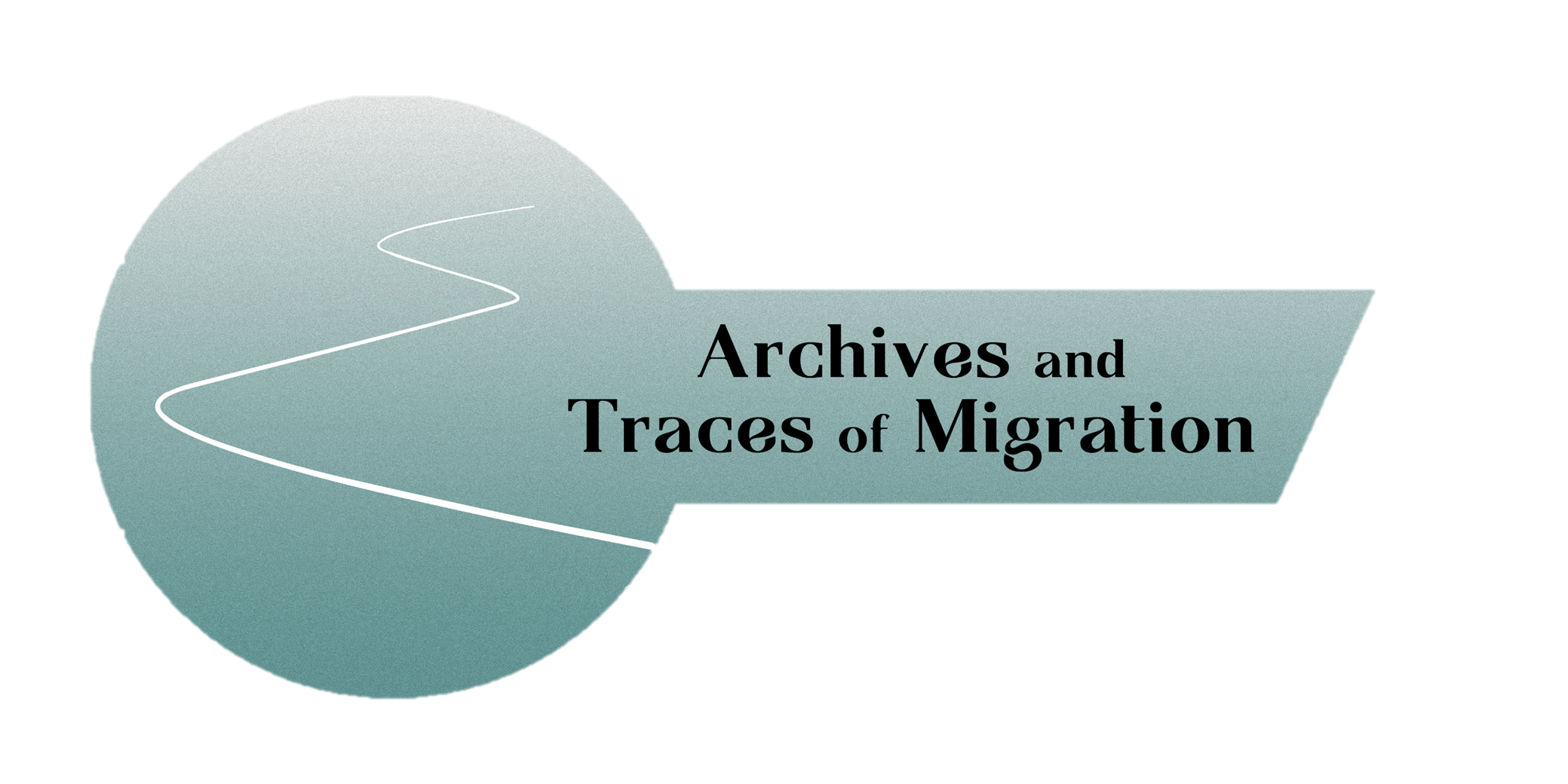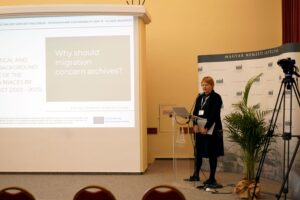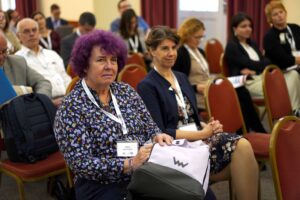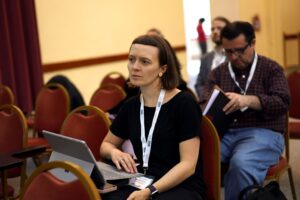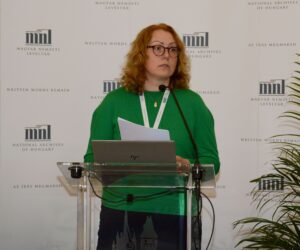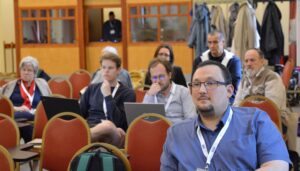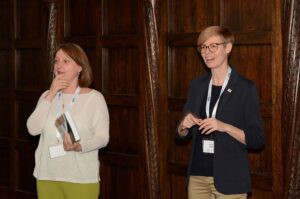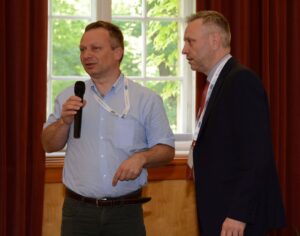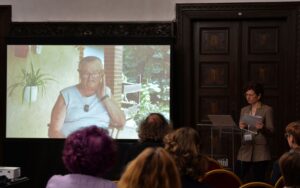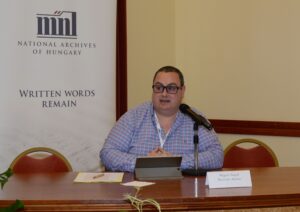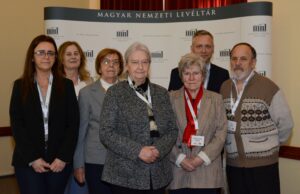Archives and Traces of Migration (AToM) Symposium Report | ICARUS CONVENTION #34
The international conference, held under the auspices of ICARUS – the International Centre for Archival Research – took place in the heart of Budapest’s City Park, in the historic building of the Hungarian Agricultural Museum and Library. From May 12 to 15, 2025, this professional gathering focused on themes inspired by European archival projects and the broader societal issues currently impacting memory institutions.
Nearly 100 archivists, cultural heritage, and sustainability professionals attended in person, with an additional 50 participants joining online. Over three days, members of the ICARUS community, representatives of the AToM and SAGA projects, and other invited experts shared insights under the overarching theme: Archives Reflecting 21st Century Challenges – Migration and Sustainability.
The presentations explored how the identity of archives is evolving—both as guardians of historical memory and as dynamic institutions actively responding to contemporary global concerns.
The event also featured a series of site visits to important archival and cultural institutions. Participants had the opportunity to explore the Open Society Archives, the National Archives of Hungary’s palace at Bécsi kapu tér, the National Museum Conservation and Storage Center, and the headquarters of ARCANUM Ltd. These visits fostered meaningful exchange and broadened participants’ professional perspectives.
As part of the convention, the AToM symposium unfolded over six thematic sessions, each examining migration from archival, historical, and theoretical perspectives. The contributions highlighted diverse case studies and methodological approaches, emphasizing the significance of archives in preserving and interpreting migratory experiences across time and space.
The first session focused on the archival heritage of historical migrations. Presenters examined how traces of mobility are embedded in early humanist and immigrant networks at the dawn of print culture, in Ottoman-era archival materials related to 19th-century Skopje, and in literature that grapples with the complexities of identity in migratory contexts. Through the examples of Vassilis Alexakis and Predrag Matvejević, the session offered reflections on how migration reshapes both personal and collective narratives.
The second session shifted focus to how migration is documented and analyzed in archival research. Papers explored the challenges of tracing the legacies of Hungarian technical intellectuals, the emigration patterns from the Prespa region of North Macedonia, and the repatriation of Hungarian émigré collections such as that of József Szilágyi. A further contribution addressed the population exchange between Czechoslovakia and Hungary after World War II, illustrating how state-driven migration policies left behind rich yet complex archival footprints.
The third session addressed broader archival challenges related to migration documentation. A keynote lecture examined how to bridge the gap between expatriate experiences and archival practices. Other speakers discussed institutional holdings such as the Emigrant Service Fund at the Bank of Naples and explored innovative uses of files related to population exchanges. These presentations reflected on both technical and ethical considerations of migration archiving.
Running parallel to this was a session devoted to Jewish histories and migrant networks, underlining the power of archives to reconstruct suppressed or fragmented narratives. Contributions highlighted the presence of Jewish individuals in land registry archives in Kotor and the history of the Jewish National Fund in Hungary. The AToM project was also presented in this context, with a focus on its achievements and impact.
The fifth session returned to the theme of past migrations, broadening its geographical and disciplinary scope. It included studies on German minority archives in Poland and an innovative social media exhibition designed to share diverse migration stories within the AToM project. Speakers also addressed the theoretical foundations of the project and presented case studies on student migrations from the Republic of Dubrovnik in the 18th century. This session underscored the variety of ways in which mobility shapes archival records and cultural heritage.
The sixth session continued the theme of migration seen through archival practice. Presentations focused on diasporic identity and memory in Hungarian American contexts, participatory approaches to building living history collections, and the role of classification systems in structuring migration-related knowledge. One presentation highlighted how the legacy of a mobile artist intersects with archival preservation and cultural identity. Several presenters revisited earlier themes, reinforcing the interconnectedness of archival work, personal storytelling, and public engagement.
Finally, the seventh session addressed the ethical responsibilities involved in archiving displacement. A keynote presentation introduced the Living Refugee Archive as a participatory model for documenting forced migration. Other contributions emphasized the importance of creating welcoming archival spaces for displaced individuals and raised critical questions about archivists’ roles in safeguarding refugee narratives with care and integrity.
Altogether, the AToM Symposium was a resounding success, bringing together more than 150 participants from across Europe and beyond, both on-site and online. Over three inspiring days, the conference offered a rich and multifaceted exploration of migration through archival theory and practice. It sparked lively interdisciplinary dialogue, showcased innovative archival methodologies, and reaffirmed the essential role of archives in shaping inclusive historical narratives. By bridging academic insight, community engagement, and professional exchange, the event demonstrated how memory institutions can respond creatively and ethically to the challenges of our time—ensuring that the stories of people on the move are preserved, heard, and understood.
The ICARUS Convention #34 hosts the concluding activity of the Creative Europe AToM project, seeks to engage cultural heritage professionals, scholars from diverse disciplines, and members of civil society organizations in meaningful discussions on migration-related issues. It aims to foster collaboration and explore innovative approaches to documenting and preserving the experiences of migrant communities.
Dates: May 12- 13, 2025.
Venue: Budapest, TBD
Format: hybrid
The conference will be held in a hybrid format for the audience, allowing them to attend either in person or via video call. Please note that online attendees will be able to interact only through the chat function.
Program committee:
– Bermejo Alonso, Miguel Ángel
– Díaz Martínez, Cristina
– Gilliland, Anne J.
– Štefanac, Tamara
– Szatucsek, Zoltán
– Vogels, Nina
Organizational committee:
– Čurik, Ivana
– Hegedűs, István
– Komlósi-Gera Zsófia
– Lemić, Vlatka
– Maximoff, Caroline
– Palcsó, Anna
Call for papers: Archives and Traces of Migration Symposium
Symposium scope and topics
Despite the massive historical and growing movement of people between countries and around the globe, as well as the burgeoning economic, political and cultural interest in many countries of origin to build closer ties with their diasporas, migrant individuals and communities often fall between the cracks of library, archival, museum, and other cultural heritage institutions. What are the roles of these institutions in supporting research on migration? What are their societal responsibilities toward keeping memory, and documenting and providing access to material created by migrant communities and individuals?
We invite memory heritage professionals, archival, museum and library professionals as well as scholars to contribute to a focused discussion on archival and documentary traces of migration. We are interested in topics including but not limited to the following:
– collecting, processing, and presenting documentary and archival materials connected with migration;
– collecting, archiving, and publishing oral histories connected with migration;
– collaboration between migrant communities and cultural and heritage institutions;
– case studies on migration based on archival and documentary materials;
– archives in diaspora communities;
– archives of immigrant communities;
– migration and material traces.
Submission guidelines
We invite proposals for twenty minute oral in-person presentations in English.
Please submit an abstract of 1800 characters by 28 February 2025 with filling up the online form.
Authors of accepted abstracts will be notified by March 14th 2025.
The participation at the Symposium is free of charge for all participants.
Important information
Abstract submission deadline: 28 February 2025
Acceptance decision deadline: 14 March 2025
Conference dates: 12 – 13 May 2025
Registration: 1 March – 28 April 2025
Participants are responsible for their own travel and accommodation costs and organization.
About the Symposium’s organizers
The symposium “Archives and Traces of Migration” is organized by the National Archives of Hungary in cooperation with Spanish State Archives, Foundation De Domijnen, and ICARUS Croatia. It is part of the ICARUS Convention #34, an event exploring how archives respond to 21st-century challenges.
The symposium is part of the homonymous project AToM co-funded by the European Union.
The project sought to investigate and develop best practices for the appraisal and preservation of, and access to archival and other documentary heritage material relating to migration, broadly defined to include migrant, emigrant, immigrant, displaced, and other categories of expatriate and diaspora communities. It therefore encompassed not only those who see themselves as having moved away permanently from their homelands and settled elsewhere, but also those who have left their countries involuntarily such as refugees and exiles, and those who aspire at some point to return to their countries of origin, such as expatriate workers and their families, people in transit and students, who might or might not identify as part of a transnational or diasporic community, and those who return to their homelands following régime change.

